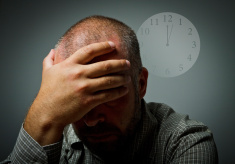
Photo of a man with his head in his hand sitting in front of a fading clock
Anxiety Disorders
Anxiety is a normal human emotion that everyone experiences at times. Many people feel anxious or nervous before taking a test, making an important decision or when faced with a problem at home or work. Anxiety disorders are different, however. They can cause such distress that it interferes with a person's ability to lead a normal life.There are many different types of anxiety disorders. One disorder is panic disorder. People with this condition have feelings of terror that strike suddenly and repeatedly with no warning. Sweating, chest pains palpitations (unusually strong or irregular heartbeats) and a feeling of choking, which may make a person feel like he or she is having a heart attack or "going crazy" are some of the other symptoms of panic disorder.
Social anxiety disorder involves overwhelming worry and self-consciousness about everyday situations. The worry of being judged by others or behaving in a way that might cause embarrassment or lead to ridicule are other symptoms.
An intense fear of a specific object or situation such as snakes, heights or flying is a specific phobia. The level of fear is usually inappropriate to the situation and may cause the person to avoid common, everyday situations.
Generalized anxiety disorder involves excessive, unrealistic worry and tension even if there is little or nothing to provoke the anxiety.
The exact cause of anxiety disorders is unknown. But anxiety disorders-like other forms of mental illness-are not the result of personal weakness, a character flaw, or poor upbringing. As more research on mental illnesses is being done, it is becoming clear that many of these disorders are caused by a combination of factors, including changes in the brain and environmental stress. Anxiety disorders may be caused by problems in the functioning of brain circuits that regulate fear and emotions. Certain environmental factors-suck as trauma or a significant event-may trigger an anxiety disorder in people who have an inherited susceptibility to developing the disorder.
Millions of adult Americans are affected by anxiety disorders. Most disorders begin in childhood, adolescence and early adulthood. Women seemed to be affected slightly more often than men. Race does not seem to play a part. There are no lab tests that can be used to diagnose anxiety disorder, but physicians may use various tests to rule out physical illnesses as the cause of the symptoms. If no physical illness is found, you may be sent to a psychiatrist or another mental health professional. These individuals are specially trained to diagnose and treat anxiety disorders.
Fortunately, much progress has been made in the last two decades in the treatment of people with anxiety disorders. The exact treatment approach will depend on the type of disorder, with the possibility of one or a combination of the following therapies being used. Medication, including anti-depressants or anti-anxiety reducing drugs, are used to help reduce the symptoms of anxiety. Psychotherapy (a type of counseling) addresses the emotional response to mental illness. Cognitive-behavior therapy is used to help the person learn to recognize and change thought patterns and behaviors that might lead to troublesome feelings. Dietary, lifestyle changes and relaxation therapy are also used to help with controlling anxiety.
Although anxiety disorders cannot be prevented, there are things that you can do to help lessen or control them. Stop or reduce the consumption of caffeine, such as tea, cola, coffee, energy drink and chocolate. Always ask your doctor or pharmacist before taking any over-the-counter medicines or herbal remedies. Many contain chemicals that can increase anxiety. Seek counseling and support if you start to regularly feel anxious with no apparent cause.
If you feel you have any of these symptoms, contact your local physician or call the Sabetha Family Practice at (785) 284-2141 to make an appointment. With help, anxiety disorder can be treated.
